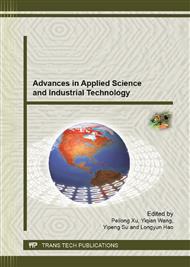[1]
Zuchang Zhong. Journal of Business Economics, Vol. 234(2011). No. 4, pp.19-26. (In Chinese).
Google Scholar
[2]
Lanbing Li, Chun hun Li. Port Economy, (2011). No. 4, pp.33-38. (In Chinese).
Google Scholar
[3]
Haibo Kuang. Chinese Journal of Management Science, 2007, 15 (3): 142-148.
Google Scholar
[4]
Yi Zhang, Qi Chen. East China Economic Management, Vol. 25(2011). No. 4, pp.74-79. (In Chinese).
Google Scholar
[5]
Fuming Zhang, Xianzhong Meng. Industrial Engineering and Management, 2010, 15(2): 46-49.
Google Scholar
[6]
Yahua Wang, Wu Fan, Zheng Wang. China Economic Quarterly, Vol. 7(2008). No. 3, pp.891-912. (In Chinese).
Google Scholar
[7]
Baofeng Jing. Technology Economics, Vol. 30(2011). No. 9, pp.104-113. (In Chinese).
Google Scholar
[8]
Xunping Lei, Yang Wu. Journal of Tianjin University of Commerce, Vol. 32(2012). No. 3, pp.46-50. (In Chinese).
Google Scholar
[9]
Xuhui Wang, Jian Xu. Finance and Trade Research, Vol. 32(2009). No. 3, pp.117-124. (In Chinese).
Google Scholar
[10]
Baofeng Jing, Xia Zhou. Industrial Engineering Journal, Vol. 15(2012). No. 2, pp.41-47. (In Chinese).
Google Scholar
[11]
Xueping Deng, Xu Wang. Journal of Chong Qing University(Social Science Edition), Vol. 15(2009). No. 5, pp.43-47. (In Chinese).
Google Scholar
[12]
Xueping Deng, Xu Wang. Ada Suk Fung Ng. Systems Engineering-Theory & Practice, Vol. 29 (2009). No. 4, pp.34-41. (In Chinese).
Google Scholar
[13]
Li Bo. Journal of Shenyang Institute of Engineering (Social Sciences), Vol. 6(2010). No. 2, pp.200-202. (In Chinese).
Google Scholar
[14]
Yu Tian. Logistics Management, 2000, No. 2, pp.15-19. (In Chinese).
Google Scholar
[15]
Trujillo L, BEATRIZ T. Maritime Economics &Logistics, Vol. 9(2007). No. 2, pp.148-171.
Google Scholar
[16]
Estache A, Gonzalez M, Trujillo L. World Development, Vol. 30(2002). No. 4, pp.545-560.
Google Scholar
[17]
Tan Lin, Ling Wang. Port Economy, 2008, No. 12, pp.46-49. (In Chinese).
Google Scholar
[18]
Yongze Yu, Peng Wu. Industrial Economics Research, 2010, No. 1, pp.65-71. (In Chinese).
Google Scholar
[19]
Hokey M, Seong J. Supply Chain Management: An International Journal, Vol. 11(2006). No. 3, pp.259-265.
Google Scholar
[20]
Michnel K, PAUL R. Journal of Supply Chain Management, Vol. 40(2004). No. 1, pp.35-51.
Google Scholar
[21]
Youdong Li, Zhanxin Ma. Journal of Beijing Jiao tong University(Social Sciences Edition), Vol. 11(2012). No. 2, pp.32-39.
Google Scholar
[22]
Min Fan. Modern Management Science, 2010, No. 2, pp.48-50. (In Chinese).
Google Scholar
[23]
Jianrong Tang, Lingchu Lu. China Market, 2013, No. 1, pp.40-47. (In Chinese).
Google Scholar


